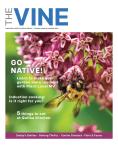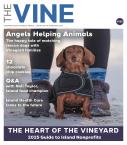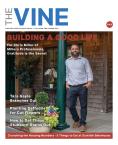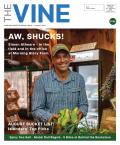As it approaches its 7th anniversary, The Grey Barn and Farm in Chilmark has established itself as a popular purveyor of local and organic milk, eggs, meats and cheeses. Owners Eric and Molly Glasgow will be the first to tell you that every day is a learning day, since neither grew up on farms and each learned the basics online. But their success, despite setbacks, including a fire that destroyed their creamery in 2013, is undeniable.
Their organic Eidelon, Prufrock, and Blue Bird cheeses are now widely sold throughout the Northeast. Eric took time from his hectic schedule to talk with us about that aspect of their business.
Why did you decide to make cheese?
Making cheese is one way to have a sustainable enterprise when you have the massive seasonality associated with our population here. It is also the natural way to preserve milk. Our original idea was to create different cheeses to essentially preserve the output of the farm. But what we’ve become in practice is a wholesale cheese producer. The vast majority of our cheese leaves the island.
How steep was the learning curve when you started?
Really steep, but I feel we are in a pretty good place. Our recipes are well established, so in some respects, we know what we’re doing, yet in other respects we are feeling our way through how we manage our milk, production and sales. There are a lot of moving pieces.
What’s the biggest challenge?
Consistency is sort of the trick. In some ways, it’s easy to make a good cheese. It’s harder to make a great cheese, and hardest to make one consistently.
I was surprised to learn about your cheese caves. Can you explain why they are needed?
Basically, cheese is a living organism. Traditionally, in order to get the right bacteria and mold into it, you need a relatively cool, humid environment which, historically, was caves or cellars. Essentially, the caves are very sanitary, tightly controlled temperature and humidity environments to properly age the cheese.
What has surprised you most about making cheese?
It’s complicated. It goes from feast to famine. One week we will be completely sold out and everyone will want more and then two weeks later, it’s “Oh my God, we just wrapped all this cheese and business is very slow.” So it’s very nerve wracking. It’s a very perishable product.
What do you think has been your most important contribution to the Island?
I’m not really comfortable commenting on why I’m so great. We do have 7-plus people who make their living here. And we try really hard to keep our prices in the realm of reality. I try not to make them unaffordable or unapproachable for people who live here.
Paula Lyons is a former ABC and CBS television consumer journalist who is now semi-retired and lives in Vineyard Haven.











Comments